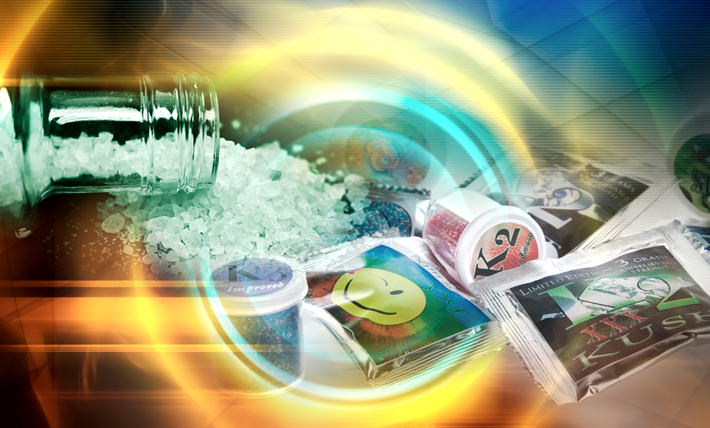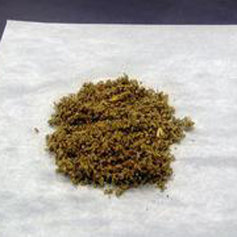Synthetic Drugs Addiction Information

Simply stated, “synthetic” means manmade. Synthetic drugs are any drug type that are made by humans and which do not occur in nature. A synthetic drug could also refer to a naturally occurring drug that has been significantly altered during its processing.
Examples of synthetic drugs include:

- Bath salts. Bath salts refer to synthetic cathinones, manmade stimulant drugs that are chemically similar to cathinone, the mind-altering substance found in the khat plant. While the leaves of the khat plant certainly create risk for the user when ingested, synthetic cathinones like bath salts are much more potent and potentially far more dangerous because of the unknown effects altered cathinones might have on the body and mind.

- Synthetic marijuana. Synthetic marijuana is a term used to refer to plant matter that has been sprayed with a liquid, psychoactive chemical made to mimic some of the effects of marijuana. But whereas THC from the marijuana plant is a naturally-occurring, mind-altering substance, the ingredients in synthetic marijuana are unpredictable and potentially very dangerous. Reports from the CDC indicate that synthetic marijuana, K2, and Spice can even be fatal.

- Spice/K2. Another version of synthetic marijuana, Spice, and K2, both fall under the drug classification known as “synthetic cannabinoids.” Synthetic cannabinoids are human-made, mind-altering chemicals which are usually sprayed onto plant matter or dissolved in a liquid. Spice and K2 have some similar chemical structures as those found in the marijuana plant. However, Spice and K2 are far removed from naturally occurring cannabis. The mental effects of drugs like Spice and K2 are usually far more pronounced, more unpredictable, more dangerous, and even life-threatening.
Consequences of Use of Synthetic Drugs
Because the ingredients of synthetic drugs are always being changed to create legal loopholes for their continued sale at convenience stores, gas stations, and head shops, users never really know what they are getting when they use such substances.
Physically, the consequences of synthetic drug use can vary greatly. Many people who use synthetic drugs become addicted to them. Because synthetic drugs create a powerful, unpredictable, mind-altering effect, the adverse side effects on one’s mental state can be quite extreme. A psychological need to keep using the drug is just one consequence. A chronically altered mental state and the risk for permanent mental damage are also potential consequences of using synthetic drugs.
Synthetic drug use also takes its toll on people’s relationships, professional lives, financial conditions, and legal status. Given how much drug use can change people, it’s very safe to say that using these types of drugs will be harmful to one’s relationships with their family members and loved ones. And if one cannot stay sober and continues to use such drugs, it’s only a matter of time before their habit negatively affects their work life. After that, financial ruin is likely to follow and possibly even trouble with the law, jail time, etc. Using synthetic drugs is a slippery slope towards a more challenging and unpleasant life.
The Effects of Using Synthetic Drugs

There are about 200 different types of synthetic drug compounds and at least 90 different synthetic marijuana compounds. And given the fact that these substances are made in illegal labs, it is almost impossible to know what’s in each strain or batch. That, in turn, makes it even more challenging to predict the effects of using such substances, making them all the more dangerous.
Some of the short-term effects of synthetic drug use include:
- Anxiety
- Aggressive behavior
- Seizures
- Paranoia
- Loss of consciousness
- Nausea and vomiting
- Coma
- Death
Keep in mind that, because it’s virtually impossible to know what’s in synthetic drugs, it’s impossible to use these drugs with any semblance of caution. Such drugs should not even be used once, and if someone is using them regularly, they are taking their lives into their own hands every time they do so. That’s why it’s so crucial to be able to spot the signs of drug use and to be able to intervene as soon as one knows that they’re loved one is using drugs.
Signs of Synthetic Drug Use — Knowing What to Look For
Signs of synthetic drug use may include:
- Nervous, fearful and often paranoid behavior
- Self-destructive behavior
- Suicidal tendencies and attempts
- Agitated, anxious, and restless demeanor
- Rambling, incoherent speech
- Extreme mood swings from euphoria to fear in a matter of minutes
Because of the unpredictable and ever-changing chemical composition, synthetic drugs like bath salts (synthetic cathinones) and synthetic marijuana (synthetic cannabinoids) should be avoided at all costs. If one can determine that a loved one is using such substances, efforts should be taken to get that loved one into treatment as soon as possible.
Sources:
